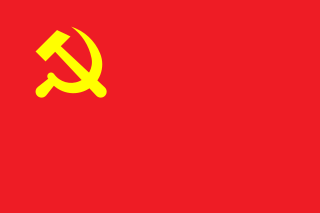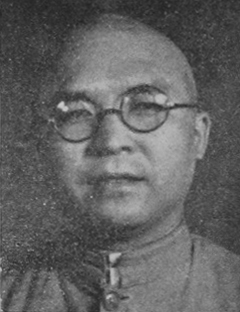The orders of precedence in China is the ranking of political leaders in China for the purposes of event protocol and to arrange the ordering of names in official news bulletins, both written and televised. It is also sometimes used to assess perceived level of political power. Although there is no formally published ranking, there is usually an established convention and protocol, and the relative positions of Chinese political figures can usually be deduced from the order in meetings and especially by the time and order in which figures are covered by the official media. Since 1982, the General Secretary of the Chinese Communist Party has been the highest-ranking official in the People's Republic of China (PRC).

The Secretariat, officially the Secretariat of the Central Committee of the Communist Party of China, is a body serving the Chinese Communist Party (CCP)'s Politburo and Standing Committee. The secretariat is mainly responsible for carrying out routine operations of the Politburo and coordinating organizations and stakeholders to achieve tasks set out by the Politburo. It is empowered by the Politburo to make routine day-to-day decisions on issues of concern in accordance with the decisions of the Politburo, but it must consult the Politburo on substantive matters.

The Chairman of the Central Committee of the Chinese Communist Party was the leader of the Chinese Communist Party. The position was established at the 8th National Congress in 1945 and abolished at the 12th National Congress in 1982, being replaced by the general secretary. Offices with the name Chairman of the Central Executive Committee and Chairman of the Central Committee existed in 1922–1923 and 1928–1931, respectively.
Hu Qili is a former high-ranking politician of the Chinese Communist Party (CCP), known as a champion of the country's economic reform program in the 1980s. He was the first secretary of the CCP Secretariat from 1985 to 1989 and a member of the CCP Politburo Standing Committee from 1987 to 1989. Following the 1989 Tiananmen Square protests, he was purged for his sympathy toward the student protesters and his support for General Secretary Zhao Ziyang's opposition to the use of armed force. However, he returned to politics in 1991. In 2001, he became chairman of the Soong Ching-ling Foundation.

The vice president of the People's Republic of China, commonly called the vice president of China, is the deputy to the president of the People's Republic of China, the state representative of China.

Wang Dongxing was a Chinese military commander and politician, famous for being the chief of Mao Zedong's personal bodyguard force, the 9th Bureau of the Ministry of Public Security. Wang held many important positions, both in the Chinese Communist Party (CCP) and the government; he was Deputy Minister of Public Security in 1955–1958 and again in 1960–1970 and notably served as CCP Vice Chairman from 1977 to 1980, under Chairman Hua Guofeng.

Wang Zhaoguo is a retired Chinese politician who came to prominence during the era of Deng Xiaoping. An automobile factory technician by trade, Wang had a long and varied political career, known for having acquired a ministerial-level position at the age of 41. Before entering the Politburo of the Chinese Communist Party in 2002, he successively served as the First Secretary of the Communist Youth League, the chief of the party's General Office, Secretary of the Central Secretariat, Governor of Fujian, Head of the United Front Work Department and Vice-Chairman of the CPPCC.

Jiang Daming is a politician of the People's Republic of China. He served as the Minister of Land and Resources, and formerly served as Governor of Shandong province.

Chen Zhili is a retired senior Chinese politician who served as State Councilor and Minister of Education, and a Vice Chairperson of the National People's Congress. She was vice chairman of the organization commission of the 2008 Beijing Olympics.
Wu De, born Li Chunhua (李春华), was a Chinese Communist revolutionary and politician of the People's Republic of China. He served in provincial-level leadership positions in Pingyuan Province, Tianjin municipality, Jilin Province, and Beijing municipality, and was a member of the Politburo of the Chinese Communist Party from 1973 to 1980. After the Cultural Revolution, Wu was a key supporter of Hua Guofeng and was forced out of politics after Deng Xiaoping ousted Hua from his leadership position.
Hao Peng is a Chinese politician and business executive, currently serving as Communist Party secretary of Liaoning. He served as the governor of Qinghai province between 2013 and 2016, and prior to that, a vice chairman of Tibet Autonomous Region. He additionally served as the chairman of the State-owned Assets Supervision and Administration Commission (SASAC) between 2019 and 2023.

Hu Sheng, was a Chinese Marxist theorist and historian. He was President of the Chinese Academy of Social Sciences from 1985 to 1998, and also served as Vice-Chairman of the seventh and eighth National Committees of the Chinese People's Political Consultative Conference and member of the 12th Central Committee of the Chinese Communist Party.
Liu Guanglong is a former Chinese politician who spent most of his career in north China's Shanxi. He was investigated by the Chinese Communist Party's anti-graft agency in December 2014. Previously he served as the Vice-Chairman of Lüliang Committee of the Chinese People's Political Consultative Conference.

The President of the People's Republic of China, commonly called the President of China, is the state representative of the People's Republic of China, which on its own is a ceremonial office and has no real power in China's political system. However, since 1993, the post has been held by the general secretary of the Chinese Communist Party (CCP) and chairman of the Central Military Commission, who is China's de facto leader.

Liu Lantao was a Chinese Communist revolutionary and politician of the People's Republic of China.

Buhe or Bu He, also known as Yun Shuguang, was a Chinese politician of Mongol descent. The eldest son of the powerful Inner Mongolia leader Ulanhu, Buhe served as Chairman of Inner Mongolia Autonomous Region between 1982 and 1993. Between 1993 and 2003 he was Vice Chairman of the National People's Congress.
Lai Derong is a former Chinese politician who spent most of his career in southwest China's Guangxi Zhuang Autonomous Region. At the height of his career, he served as vice chairman of the Guangxi regional committee of the Chinese People's Political Consultative Conference (CPPCC). As of July 2016 he was under investigation by the Communist Party's anti-graft watchdog. Then he was expelled from the Party and removed from his post and will now serve as an ordinary member of government staff. On 21 September 2016, he was removed from membership of China's top political advisory body, the Chinese People's Political Consultative Conference. Eight days later, he was also removed from membership of the 12th Autonomous Regional People's Congress.
Liu Jun is a former Chinese politician who spent most of his career in southwest China's Guangxi Zhuang Autonomous Region. He was investigated by China's top anti-graft agency in February 2018. Previously he served as vice chairman of the Guangxi Regional Committee of the Chinese People's Political Consultative Conference and before that, chairman of the Standing Committee of Guilin Municipal People's Congress and party secretary of Guilin.
Li Jiexiang is a former Chinese politician. He was investigated by China's top anti-graft agency in April 2022. Previously he served as vice chairman of Qinghai Provincial People's Congress and before that, executive vice governor of Qinghai. He is a representative of the 19th National Congress of the Chinese Communist Party.





























